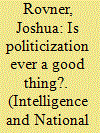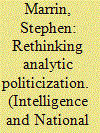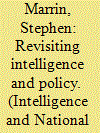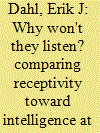| Srl | Item |
| 1 |
ID:
118368


|
|
|
|
|
| Publication |
2013.
|
| Summary/Abstract |
Politicization is the manipulation of intelligence estimates to reflect policy preferences. Policymakers are guilty of politicization if they compel intelligence agencies to alter their conclusions in ways that are politically convenient or psychologically comforting. Intelligence officials are guilty of politicization if they shape their estimates to reflect their own beliefs and preferences. At first glance politicization appears to be an unalloyed hazard: manipulating estimates seems to make bad intelligence inevitable. Nonetheless, some observers argue that under certain circumstances politicization can be a good thing, or at least a necessary risk. Intelligence officials should be willing to take that risk if the alternative means isolating themselves from the policy process and sacrificing any possible influence over policymakers' judgment. They also should be willing to tone down their conclusions on major issues, or withhold estimates on minor ones, in order to avoid offending policymakers. This kind of 'soft politicization' does not mean outright pandering, but it does constrain intelligence leaders from being blunt about estimates that are frankly at odds with policy beliefs and preferences. This article evaluates the possible benefits of politicization and tests it against the historical record. I conclude that politicization - even soft politicization - undermines the quality of threat assessment and does lasting damage to intelligence-policy relations.
|
|
|
|
|
|
|
|
|
|
|
|
|
|
|
|
| 2 |
ID:
118366


|
|
|
|
|
| Publication |
2013.
|
| Summary/Abstract |
The relationship between intelligence analysis and policy decisions is a contentious one with both policymakers and intelligence analysts frequently expressing frustration over its underlying dynamics and with each faulting the behavior of the other. This article examines one aspect of this relationship, the manner in which intelligence analysis can become politicized. Rather than view politicization as an aberration it is treated here as a normal feature of intelligence analysis. A typology of politicization organized around the concepts of hard and soft politicization is presented and illustrated with historical examples from the American experience with intelligence analysis.
|
|
|
|
|
|
|
|
|
|
|
|
|
|
|
|
| 3 |
ID:
118367


|
|
|
|
|
| Publication |
2013.
|
| Summary/Abstract |
Politicization as a term used in intelligence studies is poorly defined, conceptualized and operationalized. Despite the negative connotations associated with the word politicization that equate it with a form of corruption, it is not entirely clear what it is a corruption of. In short, the concept of politicization is for the most part analytically useless. This article critiques the existing status quo conceptualization for being overly broad and insufficiently nuanced, explores the nature of analytic politicization as a subset of politicization writ large, and replaces it with a narrower conceptualization that explains what makes analytic politicization bad and deserving of condemnation. Based on this evaluation, one can conclude that much of what is considered to be politicization in a corrupted sense is really just a naturally-occurring consequence of analysis and interpretation in a policy or political context.
|
|
|
|
|
|
|
|
|
|
|
|
|
|
|
|
| 4 |
ID:
118365


|
|
|
|
|
| Publication |
2013.
|
| Summary/Abstract |
The relationship between intelligence and policy has its ups and downs. Sometimes the relationship is a good one; communication flows and both sides benefit from the interaction. The optimal outcome entails the use of accurate intelligence analysis to improve decision-making. But sometimes difficulties arise and problems develop. For example, when knowledge is required for decision but is not available or is inaccurate the outcome is frequently described as an intelligence failure. A subset of this kind of intelligence failure occurs when knowledge is distorted in order to reinforce or oppose policymaker preferences or expectations. Another less successful outcome occurs when good, accurate knowledge is not used to improve policy, but is instead set aside or ignored by those who have the responsibility and obligation to make decisions. This set of articles explores the difficulties that can arise in the relationship between intelligence and policy.
|
|
|
|
|
|
|
|
|
|
|
|
|
|
|
|
| 5 |
ID:
118370


|
|
|
|
|
| Publication |
2013.
|
| Summary/Abstract |
Purposeful politicization is generally viewed as a cardinal sin by intelligence analysts because it degrades objectivity and credibility, and inadvertent influence is sometimes tolerated as a necessary evil in order to make intelligence useful. Some forms of politicization are clearly unethical, but politicization is not inherently evil. In fact it is an ethically neutral form of rhetorical discourse which when properly controlled can provide policymakers with additional decision advantage. When viewed through a rhetorical lens, evidence-based purposeful politicization is more objective than inadvertent influence because it does not try to hide where the evidence leads. By decoupling objectivity and neutrality, it becomes clear that taking a stand on the evidence or making a tough recommendation based on professional judgment are not practices that need to be avoided. As intelligence practitioners seek to remain relevant in the 21st century, embracing ethically-controlled, evidence-based, policy prescriptive analysis can give them the tools they need to succeed.
|
|
|
|
|
|
|
|
|
|
|
|
|
|
|
|
| 6 |
ID:
118371


|
|
|
|
|
| Publication |
2013.
|
| Summary/Abstract |
In 2012, we - the North American editors of Intelligence and National Security - solicited by email opinions from members of the journal's editorial board about the state of intelligence studies. This report summarizes the central findings of the survey. The purpose is to stimulate further discussion on this topic among INS readers and contributors. The questions we posed are presented in bold below, followed by a summation of the various answers we received.
|
|
|
|
|
|
|
|
|
|
|
|
|
|
|
|
| 7 |
ID:
118369


|
|
|
|
|
| Publication |
2013.
|
| Summary/Abstract |
After surprise attacks and other intelligence failures, the complaint is often heard that if only decision-makers had listened more closely to the warnings they had received, disaster might have been avoided. But even though it is generally agreed that intelligence is of little use unless it is received and understood by policymakers, we actually know little about why some leaders are receptive toward intelligence, while others are not. This article argues that the willingness of decision-makers to listen to intelligence depends primarily on two factors: their belief in the seriousness of the issue or threat involved, and their trust in the utility of intelligence. It examines contrasting receptivity toward intelligence in the cases of Pearl Harbor and the Battle of Midway, and suggests that our current models of intelligence-policy relations need to be revised.
|
|
|
|
|
|
|
|
|
|
|
|
|
|
|
|